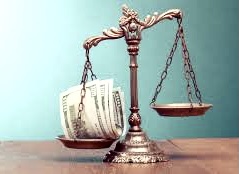Special costs , in a nutshell means that the losing party pays all the legal fees of the winning party, and are being awarded on an increasingly frequent basis for reprehensible behavior.
The general public by and large for many decades already thought that was the law, but in fact, it is a relatively new development, especially in estate litigation.
As a matter of trial practice , awards of special costs are actually rare, and the award of costs, while discretionary and based on a number of factors, rarely consists of payment of the entire winning parties costs, but only a significant portion thereof.
There are several other blogs on this website on situation where special costs and other types of court awarded costs are discussed in detail, including:
November 19, 2013
September 1, 2013
August 18, 2013
April 14,2013
May 24, 2012
May 23, 2012
I have recently been blogging about the Panghali case where the ten year old girl was awarded $500,000 damages against the murderer of her mother, pursuant to the Family Compensation Act.
Generally speaking there must be ” reprehensible conduct” of the party at fault, and the Court refused to award special cots against the murderer, as his reprehensible conduct was not directly related to the course of the litigation.
The Court explains its rationale for refusing the winning party special costs against the losing party as follows:
The plaintiffs claim special costs. They say that such costs are available where the conduct giving rise to the liability is reprehensible and criminal in nature. They cite Wiebe v. Gunderson et al, 2003 BCSC 1931, for that principle.
[97] The defendant responds that the “motivation” of the plaintiffs in seeking special costs is based on the defendant’s criminal conduct and that somehow it is really a claim for punitive damages. Therefore, relying on B. (P.) v. B. (W.) (1992), 11 O.R. (3d) 161 (Gen. Div.) at para. 21, he submits he has already been sanctioned and punished and that “to award punitive damages in a civil lawsuit would amount to double jeopardy”.
[98] With respect there are difficulties with both these statements of law. To begin, in Whiten v. Pilot Insurance Co., 2002 SCC 18 at para. 69, the Supreme Court of Canada clearly states that punitive damages may be awarded even where the defendant has already been punished by a criminal court for an offence arising out of substantially the same facts. It is simply another factor to consider in determining whether punitive damages are necessary in the circumstances. There is no “double jeopardy” defence and, as such, no argument that special costs are barred by analogy.
[99] As to the availability of special costs for pre-litigation criminal conduct, I am not convinced that the law is as clear as the plaintiff suggests. In fairness, the plaintiff did acknowledge that there are no cases that directly address similar circumstances. As such, the question of whether special costs are available in a Family Compensation Act claim where the conduct causing death is criminal in nature (and has received a criminal sanction) is, at least in British Columbia, to some extent one of first impression.
[100] The plaintiff is correct to say that special costs are awarded where there has been reprehensible conduct on the part of one of the parties. Reprehensible conduct includes “scandalous or outrageous conduct … [and] milder forms of misconduct deserving of reproof or rebuke” (Garcia v. Crestbrook Forest Industries Ltd. (1994), 119 D.L.R. (4th) 740 at para. 17 (B.C.C.A.)).
[101] The purpose of special costs is to chastise or punish a litigant, and to allow the court to disassociate itself from the litigant’s misconduct: Mayer v. Osborne Contracting Ltd., 2011 BCSC 914 at paras. 8, 10.
[102] Generally speaking, special costs are only available for misconduct in the course of the litigation itself. However, in exceptional circumstances, special costs can be awarded where pre-litigation conduct warrants rebuke: Dockside Brewing Co. Ltd. v. Strata Plan LMS 3837, 2007 BCCA 183 at para. 90. To attract an award of special costs, the pre-litigation conduct must give rise to a compensable legal wrong: Evergreen Building Ltd. v. IBI Leaseholds Ltd., 2009 BCCA 275 at para. 33.
[103] As noted in Elsen v. Elsen, 2011 BCSC 1011 at para. 14, such awards will be “quite rare.” The case law establishes two generally accepted exceptions where special costs may be awarded for reprehensible conduct prior to litigation (see Golden Capital Sec. Ltd. v. Holmes et al., 2003 BCSC 1265 at para. 166). The first was identified in Verleg v. Angeloni (1993), 20 C.P.C. (3d) 132 (B.C.S.C.), where the court said that one exception involved misconduct giving rise to litigation in the nature of fraud or unconscionability (at para. 10). That is the exception relied on in Wiebe. It is not applicable here.
[104] The second exception is identified in Sun Life Assurance Co. v. Ritchie, 2000 BCCA 231 at para. 54:
[54] … However, there may arise circumstances where special costs may be awarded because of the reprehensible conduct giving rise to the litigation, particularly where the fruits of the litigation do not provide any appropriate compensation in relation to the reprehensible conduct. … [Emphasis added]
[105] A number of cases have commented on the Sun Life exception. In Golden Capital the court said that the special costs were suitable where such an order would be “the only method in which the court can demonstrate its disapproval for the misconduct” (para. 167).
[106] In most cases, reprehensible conduct giving rise to the cause of action can be addressed by an award of punitive damages, rather than special costs: D.H. v. L.J.H., [1997] B.C.J. No. 2724 at para. 26 (S.C.). Where the plaintiff receives punitive damages, the fruits of the litigation clearly provide compensation for the reprehensible conduct, and special costs should not be awarded. Awarding both for the same conduct would comprise double compensation: McPhillips v. British Columbia Ferry Corp. (1993), 16 C.P.C. (3d) 284 at para. 18 (B.C.S.C.). In a number of decisions the court has refused to award special costs on the basis that punitive damages have already fulfilled that function: see P.B. v. R.V.E., 2008 BCSC 613 at para. 27; and Manavi v. McDonald, [1993] B.C.J. No. 463 (S.C.) at para. 23.
[107] There are others where the court has found that the fruits of the litigation are sufficient even absent a punitive damages award. In Owners, Strata Plan KAS 3267 v. Smith, 2011 BCSC 387 at para. 27, the court noted that the defendant’s pre-litigation conduct was reprehensible, but pointed out that it gave rise to the (successful) claim for a damages award:
[27] … In my view, the fruits of this litigation, being judgment for money owing, will provide full compensation of the corporation’s loss. This is not one of those unusual circumstances were reprehensible pre-litigation conduct gives rise to a need to add special costs to the claimant’s recovery in order to redress something lacking in the main award. …
[108] In Elsen and Adtronics Signs Ltd. et al. v. Sicon Group Inc., et al. (re costs), 2005 BCSC 440 at para. 23, the misconduct complained of had given rise to the cause of action and the resultant award of damages and had therefore been adequately addressed.
[109] One of the difficulties in this case is that punitive damages are not available in a claim under the FCA: see Allan Estate v. Co-operators Life Insurance Co., 1999 BCCA 35 at para. 71. The FCA is not punitive in nature (see Duncan, para. 48). It is only meant to provide financial recompense for pecuniary losses flowing from the death itself, rather than providing a sanction for the wrongdoer’s role in the death.
[110] I agree with the plaintiffs that Mr. Panghali’s conduct was reprehensible. Indeed it is difficult to envision more reprehensible conduct than that of the defendant in murdering his wife and their child’s mother and burning her body in an effort to escape detection. However, in the circumstances I do not think that this is a proper basis for an award of special costs. First, the court has already demonstrated its disapproval of that misconduct in the criminal proceedings. Mr. Panghali is serving a life sentence for the murder. Second, I have some concerns about awarding special costs with the goal of punishing the conduct giving rise to the cause of action when the statutory basis for the cause does not permit an award of punitive damages. If special costs were claimed for misconduct in the course of the litigation itself the situation would be different; but in these circumstances such an award would essentially do indirectly what the court cannot do directly.
[111] Finally, following Adtronics and Strata Plan KAS, I find that the award of damages in this matter, which flows directly from the conduct complained of, provides full compensation for the pecuniary loss. As a result I decline to award special costs. The plaintiffs have otherwise been successful and will receive costs at Scale B.





